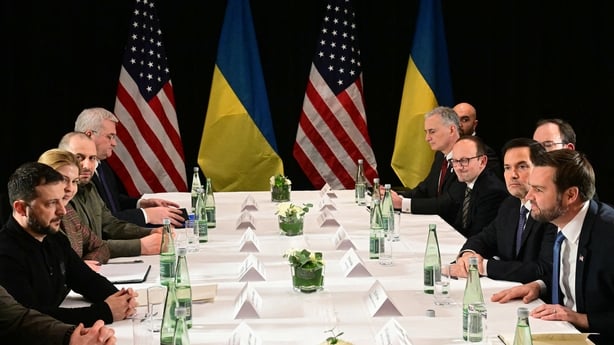After three days, the Munich Security Conference, a behemoth of a defence forum, has wrapped up.
It has been a rollercoaster for US-European relations, but so too has this entire week.
The first hint that there was something amiss with transatlantic ties came on Friday afternoon, when US Vice President spent his 30-minute speech at the forum lambasting European democracies.
Their liberal agendas and open immigration policies had not worked, he told the audience.
Mr Vance did not focus much on defence issues or the war in Ukraine – two subjects that dominated the weekend’s agenda.
Instead, he lectured European governments for, in his view, fearing populist voters.
He also criticised the organisers of the conference itself for not allowing certain parties to attend. (He meant Germany's hard-right AfD party, whose leader, Alice Weidel, he met later that evening.)
But his boss, the "new sheriff in town", would still defend their values, he reassured the stunned audience of European leaders, diplomats and high-ranking generals.
There was spare applause in the audience and his speech summed up the difference in world views between the new Trump administration and most European leaders.
Then yesterday, Ukrainian President Volodymyr Zelensky called for a European army to be created.
That proposal really is not very popular, even for the most federal-minded of European leaders.
A number of European officials pointed out that, in any case, most EU member states are members of NATO.
Taoiseach Micheál Martin was here and said a European army was "not on the agenda". Others, like Poland’s foreign minister Radoslaw Sikorski, said the same.
Mr Zelensky’s reasoning was that the US may not always be Europe’s protector given the current direction of the transatlantic partnership.
But European leaders at Munich, including Mr Martin, made it clear that their governments are committed to further increasing defence budgets in the coming years.

Despite stern calls from EU leaders at the conference (and during the week) for Europe to be part of any negotiations with Russia, it seems that the White House wasn’t listening.
That’s because yesterday evening, Keith Kellog, US Special Envoy for Russia and Ukraine, told delegates at the forum that Europe would not get a seat at the negotiating table with Russia on talks to end the war.
It was an honest remark from the retired US lieutenant-general who outlined that the US would act as an intermediary between Russia and Ukraine. Too many chefs spoil the broth was his point.
It has been reported by both Politico and Reuters that US negotiators, including US Secretary of State Marco Rubio, will start those discussions with Russian negotiators in Saudi Arabia this week.
Ukraine would get a seat at the negotiating table, said Mr Kellogg, though it is unclear yet if an invite has been extended to Kyiv.
One could argue that the EU should have seen it coming. After all, Mr Trump acted quickly to appoint a special envoy for Ukraine. The EU did not.
And now the Europeans are playing catch up to be included in talks to end the war.
So concerned are the leaders of Europe’s largest countries that they will meet in Paris tomorrow – at the invite of French President Emmanuel Macron.
All in all, events here in Munich show that there is a wide gap between senior members of the Trump administration and European leaders on how to the end the war in Ukraine.
Europeans will lament the decline of the continent's decades-old strategic ties with the US.
"After the speech of Vice President Vance on Friday, we have to fear that our common value base is not that common anymore," said a tearful Christoph Heugsen, chairperson of the Munich Security Conference.
Europe now knows that this new America will not prioritise transatlanticism and may not always come to Europe's rescue.







